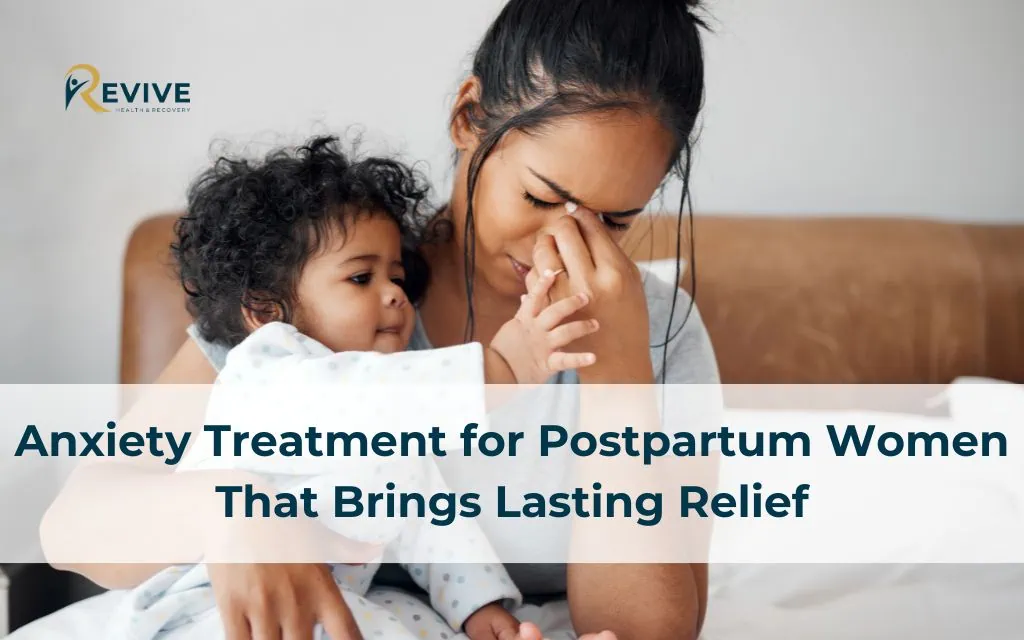Postpartum anxiety affects many new mothers, extending far beyond the usual worries of motherhood. Anxiety treatment for postpartum women is essential, as this condition impacts approximately 1 in 11 women in Colorado, with higher rates in certain demographic groups. Unlike the temporary “baby blues,” postpartum anxiety can cause persistent, intrusive worry that disrupts daily life and functioning. It includes several subtypes, such as generalized anxiety disorder, panic disorder, and postpartum obsessive-compulsive disorder.
Many women dismiss these symptoms as part of adjusting to motherhood, but stress management insights from mental health experts at Revive Health Recovery highlight the importance of distinguishing between normal concerns and clinical anxiety. Hormonal changes, combined with the stresses of caring for a newborn, make some women more susceptible to this condition. Left untreated, postpartum anxiety can lead to significant costs for both mothers and the community.
Understanding Postpartum Anxiety: More Than Just New Mom Worries
Recognizing the Signs: When Normal Worry Becomes Anxiety
Identifying postpartum anxiety requires awareness of its multifaceted symptoms, which can manifest physically, emotionally, and behaviorally.
Physical symptoms often include:
- Racing heart or palpitations that occur unexpectedly
- Persistent sleep difficulties, even when the baby is sleeping
- Digestive issues including decreased appetite or stomach discomfort
- Muscle tension and fatigue that exceeds normal new parent tiredness
Emotional and cognitive symptoms typically involve:
- Excessive worry about the baby’s health and safety
- Intrusive thoughts about potential harm coming to the infant
- Constant mental replaying of worst-case scenarios
- Persistent feeling of dread or that something bad will happen
Behavioral changes may appear as:
- Excessive checking on the baby beyond reasonable caution
- Avoiding certain situations out of fear of not managing them
- Hypervigilance around the baby that interferes with relaxation
- Seeking excessive reassurance from medical providers
When these symptoms persist beyond two weeks postpartum, interfere with your ability to care for yourself or your baby, or cause significant distress, it’s time to seek professional support. Untreated postpartum anxiety can persist for months or even years and may significantly impact maternal-infant bonding and child development outcomes.
If you’re experiencing these symptoms, please call Revive Health Recovery at (303) 268-4655 for a confidential assessment of your specific situation.

Professional Mental Health Support in Colorado
Therapy Options for Postpartum Anxiety
Colorado offers numerous evidence-based therapy approaches for postpartum anxiety, with Cognitive Behavioral Therapy (CBT) showing particularly strong outcomes. Denver hosts several specialists trained specifically in perinatal CBT techniques that address negative thought patterns and develop practical coping strategies.
Interpersonal Therapy (IPT) resources are also available throughout the metropolitan area, focusing on relationship changes, role transitions, and communication skills essential during the postpartum period. This approach proves especially beneficial for women whose anxiety connects to relationship challenges or identity shifts following childbirth.
Group therapy provides another effective treatment avenue, offering both professional guidance and peer support. Denver’s specialized postpartum anxiety groups create safe spaces for sharing experiences without judgment, reducing the isolation many new mothers feel.
For those with transportation limitations or childcare challenges, virtual therapy options have expanded significantly across Colorado, providing flexible, accessible care from the comfort of home. These telehealth services maintain confidentiality while eliminating common barriers to treatment.
Medical Approaches to Managing Postpartum Anxiety
When medication becomes necessary, Denver healthcare providers conduct thorough evaluations that consider symptom severity, breastfeeding status, and previous treatment responses. This personalized approach ensures appropriate care tailored to each mother’s specific circumstances.
Selective Serotonin Reuptake Inhibitors (SSRIs) remain the most commonly prescribed medications for postpartum anxiety in Colorado, with several options considered compatible with breastfeeding. Healthcare providers carefully discuss the risk-benefit analysis for each medication, prioritizing both maternal mental health and infant safety.
Colorado’s extended Medicaid coverage for postpartum women has significantly improved access to these medical treatments. This expanded coverage, which extends beyond the traditional postpartum period, has been associated with improved mental health treatment rates and outcomes throughout the state.
For medication consultation or to discuss your treatment options, contact Revive Health Recovery at (303) 268-4655 or email contact@revivehealthrecovery.com. Our specialists can help determine the most appropriate approach for your specific situation.
Denver’s Specialized Treatment Programs for New Mothers
Intensive Outpatient Programs in Denver
Denver leads the region in specialized intensive outpatient programs (IOPs) designed specifically for perinatal mental health concerns. The Healthy Expectations Perinatal Program at Children’s Hospital Colorado offers comprehensive services combining individual therapy, group sessions, and psychiatric care in a structured environment.
Similarly, the University of Colorado Perinatal Mental Health services provide multidisciplinary care through their specialized program. These structured approaches offer more intensive treatment than weekly therapy while allowing mothers to maintain their daily responsibilities.
Admission criteria for these programs typically include moderate to severe anxiety symptoms that significantly impact functioning but don’t require hospitalization. Most major insurance plans cover these services, though coverage levels vary. Revive Health Recovery can help navigate insurance verification and program eligibility to find the best fit for your needs.
Community-Based Support Services
Beyond clinical settings, Denver offers robust community support services. The Postpartum Support International Colorado Chapter connects women with local resources, volunteer support, and educational materials.
Luna Counseling Center’s free support groups provide accessible entry points for women hesitant about formal treatment, while Parents Thrive Colorado offers screening, referrals, and support across the state. Additionally, Parentline Colorado provides free telebehavioral health services specifically for pregnant and postpartum women, removing financial barriers to initial care.
Revive Health Recovery collaborates with these community organizations to ensure comprehensive care continuation and can connect you with appropriate resources based on your specific needs and location.

Holistic and Integrative Approaches to Anxiety Relief
Mind-Body Practices for Postpartum Anxiety
Denver’s holistic approach to postpartum anxiety includes numerous mind-body practices with proven benefits. Local mindfulness and meditation programs specifically designed for new mothers teach present-moment awareness techniques that reduce rumination and worry. These programs adapt traditional mindfulness practices to address the unique challenges of early parenthood.
Several Denver yoga studios offer classes specifically for postpartum women, combining gentle movement with breathing techniques that activate the parasympathetic nervous system, counteracting anxiety’s physical manifestations. These specialized classes welcome babies, removing the childcare barrier that often prevents new mothers from accessing self-care.
Simple breathing techniques can be practiced anywhere, making them valuable tools for managing anxiety in real-time. Revive Health Recovery teaches specific patterns, such as diaphragmatic breathing and the 4-7-8 technique, that effectively reduce acute anxiety symptoms and can be practiced during feeding sessions or other daily activities.
Nutritional Support and Supplementation
Nutritional approaches play an important role in anxiety management. Denver hosts several nutritionists specializing in maternal health who understand the unique demands of the postpartum period, including energy requirements for breastfeeding and recovery.
Evidence-based supplements that may support anxiety reduction include omega-3 fatty acids, which have demonstrated modest benefits for anxiety symptoms, magnesium, which supports neurotransmitter function, and vitamin D, particularly important in Colorado’s climate where deficiency is common.
Dietary considerations for anxiety management typically focus on blood sugar stabilization, adequate protein intake, and anti-inflammatory foods. While nutrition alone rarely resolves clinical anxiety, it provides essential support to other treatment approaches by addressing physiological factors that can exacerbate symptoms.
Lifestyle Modifications for Anxiety Reduction
Practical lifestyle modifications can significantly impact anxiety levels. Sleep strategies for new mothers – such as synchronized napping with the baby, sleep shifts with partners, and sleep hygiene practices – help maximize rest despite the interruptions inherent to infant care.
Physical activity options in Denver for postpartum women include stroller fitness groups in city parks, gentle postnatal exercise classes, and hiking groups that welcome babies. Regular movement not only reduces anxiety symptoms directly but also improves sleep quality and boosts mood-regulating neurotransmitters.
Social connection proves crucial for reducing isolation-related anxiety. Denver offers numerous mother-baby groups, organized by neighborhood, age of child, or specific interests, providing opportunities for authentic connection during a vulnerable life transition.
Revive Health Recovery incorporates these holistic approaches into comprehensive treatment plans, recognizing that mind-body connection significantly impacts recovery from postpartum anxiety. For a personalized assessment, call (303) 268-4655.
Accessing Care: Insurance, Cost, and Practical Considerations
Navigating the financial aspects of mental health care presents challenges for many new mothers. Colorado insurance plans typically cover mental health services, including postpartum anxiety treatment, though coverage specifics vary between plans. Recent mental health parity laws have improved coverage requirements, making treatment more accessible.
For those with limited insurance coverage, Denver offers several sliding scale therapy options based on household income. Additionally, community mental health centers throughout the metropolitan area provide services at reduced rates.
Free and low-cost resources include support groups, peer counseling, and community education programs. These services, while not always sufficient for treating clinical anxiety independently, provide valuable supplemental support and entry points to more comprehensive care.
Telehealth options have expanded dramatically, addressing transportation and childcare barriers that previously prevented many women from accessing care. These virtual services maintain treatment effectiveness while providing much-needed flexibility for new mothers.
For specific information about treatment costs and insurance coverage at Revive Health Recovery, please contact our team at (303) 268-4655. We’re committed to finding solutions that make quality care accessible.
Creating Your Support Network in Denver
Building a robust support network constitutes an essential component of postpartum anxiety recovery. Partner involvement significantly impacts treatment outcomes, with research showing that women with supportive partners experience faster symptom improvement. Educating partners about postpartum anxiety and providing specific ways they can help – whether through nighttime baby care, household management, or group emotional support – creates a foundation for recovery.
Extended family assistance requires clear communication about needs and boundaries. Denver’s diverse population means many families navigate cultural differences in postpartum traditions, requiring thoughtful conversations about helpful support versus added stress.
Connecting with other mothers provides invaluable peer support. Denver hosts numerous opportunities for these connections, including structured new mother groups through healthcare systems, informal meetups organized through apps like Peanut, and activity-based gatherings that combine socialization with self-care.
Online communities specific to Colorado mothers offer convenient support, particularly valuable during Colorado’s winter months when weather may limit in-person gatherings. These digital spaces provide 24/7 connection and understanding from others experiencing similar challenges.
Reliable childcare enables crucial self-care and treatment participation. Denver offers various options, including postpartum doulas specializing in maternal support, mother’s helper programs, and childcare co-ops that distribute care responsibilities among participating families.
Revive Health Recovery recognizes the importance of these support networks and can help identify appropriate resources based on your specific situation, location, and needs.
Recovery Success: What to Expect from Treatment
Understanding realistic treatment timelines helps set appropriate expectations for recovery. While some women notice initial improvement within 2-4 weeks of beginning treatment, complete symptom resolution typically requires 3-6 months of consistent care. This gradual improvement reflects the complex biological, psychological, and social factors involved in postpartum anxiety.
Signs of improvement often begin with small changes: brief periods of relaxation, reduced physical symptoms, or moments of enjoyment with the baby. These initial shifts gradually expand into longer periods of wellbeing, though progress rarely follows a straight line.
Managing setbacks requires understanding that temporary symptom increases commonly occur during treatment, particularly during times of added stress, illness, or sleep disruption. These fluctuations do not indicate treatment failure but represent normal recovery patterns. Having predetermined coping strategies for these challenging periods helps maintain overall progress.

Long-term mental health maintenance strategies focus on sustainable self-care practices, early intervention for recurring symptoms, and ongoing social support. Many women find that the skills learned during treatment provide lasting benefits beyond anxiety management, improving overall emotional resilience.
Stories from Colorado mothers who have successfully recovered from postpartum anxiety consistently highlight the transformative impact of treatment. While protecting privacy, these narratives emphasize that recovery is not only possible but common, with many women reporting deeper self-understanding and strengthened relationships following treatment.
FAQs About Anxiety treatment for postpartum women
How long does postpartum anxiety typically last without treatment?
Without treatment, postpartum anxiety can persist for months or even years. While some mild cases may gradually improve naturally, clinical anxiety often requires professional intervention for resolution. Early treatment at Revive Health Recovery significantly shortens the duration and reduces symptom severity, allowing you to enjoy this precious time with your baby.
Will taking medication for postpartum anxiety affect my ability to breastfeed?
Several medication options are considered compatible with breastfeeding. The specialists at Revive Health Recovery can help evaluate the risks and benefits of specific medications based on your individual situation, symptom severity, and feeding preferences. We prioritize both maternal mental health and infant wellbeing in our treatment recommendations.
What should I do if I can’t afford mental health treatment in Denver?
Revive Health Recovery works with clients to find affordable options, including insurance verification, sliding scale fees, and payment plans. We can also connect you with community resources and support groups that provide free or low-cost assistance. Contact us at (303) 268-4655 to discuss your specific situation and explore available options.
How is postpartum anxiety different from postpartum depression, and can I have both?
Postpartum anxiety focuses primarily on excessive worry, fear, and physical tension, while postpartum depression typically involves persistent sadness, fatigue, and loss of interest. Approximately 40% of women experience symptoms of both conditions simultaneously. Revive Health Recovery specializes in comprehensive treatment approaches that address the full spectrum of postpartum mental health challenges.
What are the most effective self-care strategies I can start implementing today?
Start with small, manageable self-care practices: 5-minute breathing exercises, brief outdoor walks with your baby, and reaching out to one supportive person daily. Stay hydrated, prioritize protein-rich snacks, and accept help with household tasks. While these strategies complement professional treatment, contact Revive Health Recovery at (303) 268-4655 for a comprehensive approach tailored to your specific needs.
Why Choose Revive Health Recovery for Postpartum Anxiety Treatment
At Revive Health Recovery, we’ve established ourselves as Denver’s premier mental health treatment center for postpartum women, offering several distinctive advantages:
- Specialized Expertise: Our team includes professionals with extensive training in perinatal mental health, ensuring treatment approaches specifically tailored to the unique challenges of the postpartum period.
- Comprehensive Care: We offer integrated treatment plans combining evidence-based psychotherapy, medication management when appropriate, and holistic approaches that address the physical, emotional, and social aspects of recovery.
- Family-Centered Approach: We recognize that postpartum anxiety affects the entire family system and provide resources for partners and extended family members to support your recovery effectively.
- Flexible Treatment Options: From intensive programs to weekly therapy, from in-person sessions to telehealth options, we adapt our services to accommodate the practical realities of life with a new baby.
- Ongoing Support: Beyond symptom reduction, we focus on long-term wellbeing, providing continuing care options that support your evolving needs throughout early parenthood and beyond.
Conclusion
Reaching out for help represents the most important step in recovering from postpartum anxiety. Denver offers comprehensive resources for new mothers, from specialized clinical programs to community support groups, from individual therapy to medication management.
Remember that postpartum anxiety, while challenging, responds well to appropriate treatment. The majority of women who seek help experience significant improvement and go on to enjoy fulfilling relationships with their children and satisfying parenting experiences.
If you’re struggling with anxiety after having your baby, contact our Denver Expert Therapy Support today at (303) 268-4655 or email us at contact@revivehealthrecovery.com. Our compassionate team is available 24/7 to answer your questions, discuss treatment options, and guide you through the first steps toward recovery.
Your wellbeing matters – not just for your sake, but for your baby and family. Visit us at 1427 S Federal Blvd, Denver, CO 80219 to learn how we can support your journey to emotional wellness during this important life transition.



